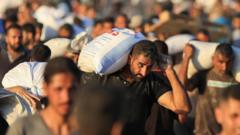Amid escalating violence and mounting humanitarian concerns in Gaza, US envoy Steve Witkoff visited a controversial aid distribution site backed by the Israel and the US. Local sentiments countered the official narrative, with accusations of brutality by IDF forces amidst critical food shortages, prompting calls for genuine humanitarian actions.
Trump Envoy’s Controversial Visit to Gaza Aid Site Raises Eyebrows

Trump Envoy’s Controversial Visit to Gaza Aid Site Raises Eyebrows
Steve Witkoff's trip to a US-backed aid distribution site in Gaza highlights deep-rooted tensions as claims of violence and starvation surface.
The Middle East remains a focal point of shifting narratives as Steve Witkoff, a representative of the Trump administration, embarks on his first visit to a contentious aid distribution center in Gaza, supported by the US and Israel. Joined by US ambassador to Israel, Mike Huckabee, the delegation aimed to gather firsthand accounts of operations conducted by the Gaza Humanitarian Foundation (GHF). Their visit coincided with escalating reports of violence surrounding GHF sites, with the United Nations estimating that at least 859 Palestinians have lost their lives in related incidents—a claim that the GHF disputes.
According to sources, Witkoff and Huckabee’s tour, which included a stop at a GHF site near Rafah, was dressed in the language of humanitarian mission. Huckabee, in a post shared on social media, celebrated GHF’s reported provision of over one million meals daily, while acknowledging the enormous logistical feat. In a striking contrast, the UN's assessments indicate that these efforts fall dramatically short of the nutritional needs of the besieged population.
In the backdrop of this visit, many Gazans viewed Witkoff’s presence as a media spectacle rather than a step toward relief. Local resident Louay Mahmoud criticized the delegation's approach, emphasizing that the envoy would only be shown a sanitized version of the reality in Gaza, divorced from the true suffering of its people. Calls for an end to the blockade and military actions by Israel resonated among those interviewed, revealing a demand for substantive change rather than symbolic gestures.
Allegations of unwarranted violence by IDF personnel near GHF’s operations have also surfaced, with a former special forces officer describing incidents of shooting at unarmed civilians. These grave claims have been categorically dismissed by GHF, presenting the officer as a disgruntled employee lacking credibility.
Since May, when GHF sites took over from the UN’s distribution framework amidst accusations of aid mismanagement by Hamas, the situation has drawn global scrutiny. Operating within Israeli military zones, these centers have produced alarming reports of casualties linked to Israeli operations targeting aid receivers, as local resistance grows to the ongoing military actions and food scarcity unveiled by the UN's humanitarian reports.
As the conflict continues to escalate, including recent Israeli airstrikes claimed to have caused further fatalities in Gaza, Witkoff's discussions with Israeli Prime Minister Benjamin Netanyahu signal attempts at a potential overhaul of ceasefire negotiations. With hostages and disarmament at the forefront, the complexities of the peace process intertwine with the urgent humanitarian crisis unfolding on the ground.



















